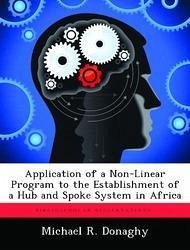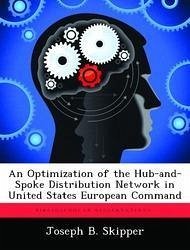Nicht lieferbar

Application of a Non-Linear Program to the Establishment of a Hub and Spoke System in Africa
Versandkostenfrei!
Nicht lieferbar
Due to the increasing threat of terrorism, particularly from the Sahara region of Africa, as well as a result of the growing strategic importance of Africa to the United States, the United States established Africa Command (AFRICOM). The mission of the Department of Defense's newest combatant command is to aid African development and promote regional security. However, this may not be an easy task, especially due to the lack of an effective and efficient transportation network on the continent. In order for AFRICOM to succeed, it will need to be able to effectively and efficiently transport pe...
Due to the increasing threat of terrorism, particularly from the Sahara region of Africa, as well as a result of the growing strategic importance of Africa to the United States, the United States established Africa Command (AFRICOM). The mission of the Department of Defense's newest combatant command is to aid African development and promote regional security. However, this may not be an easy task, especially due to the lack of an effective and efficient transportation network on the continent. In order for AFRICOM to succeed, it will need to be able to effectively and efficiently transport personnel and goods across the continent. The lack of transportation infrastructure may make this a daunting and expensive task. But, there exists a solution to the problem. The Canadian Operational Support Command (CANOSCOM) developed a mixed integer non-linear programming model based on the Foreign Policy Index of Failed and Failing States that minimizes cost and resources to support their global operations. By applying this model to Africa, AFRICOM planners can determine the optimal number and location of hubs to support operations on the continent. The Failed and Failing states index provides a realistic baseline for where AFRICOM may be involved in future operations. The models' capabilities and limitations are explored, and recommendations are made to assist AFRICOM in the use of the program to aid AFRICOM planners. This work has been selected by scholars as being culturally important, and is part of the knowledge base of civilization as we know it. This work was reproduced from the original artifact, and remains as true to the original work as possible. Therefore, you will see the original copyright references, library stamps (as most of these works have been housed in our most important libraries around the world), and other notations in the work. This work is in the public domain in the United States of America, and possibly other nations. Within the United States, you may freely copy and distribute this work, as no entity (individual or corporate) has a copyright on the body of the work. As a reproduction of a historical artifact, this work may contain missing or blurred pages, poor pictures, errant marks, etc. Scholars believe, and we concur, that this work is important enough to be preserved, reproduced, and made generally available to the public. We appreciate your support of the preservation process, and thank you for being an important part of keeping this knowledge alive and relevant.









